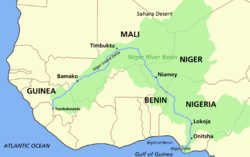Our website is made possible by displaying online advertisements to our visitors.
Please consider supporting us by disabling your ad blocker.
African Association

The Association for Promoting the Discovery of the Interior Parts of Africa (commonly known as the African Association), founded in London on 9 June 1788,[1] was a British club dedicated to the exploration of West Africa, with the mission of discovering the origin and course of the Niger River and the location of Timbuktu, the "lost city" of gold. The formation of this group was effectively the "beginning of the age of African exploration".[2]
Organized by a dozen titled members of London's upper-class establishment and led by Sir Joseph Banks, the African Association felt that it was the great failing of the Age of Enlightenment that, in a time when men could sail around the world, the geography of Africa remained almost entirely uncharted (leading to the now-offensive nickname, the "Dark Continent"). The Ancient Greeks and Romans knew more about the interior of Africa than did the British of the 18th century.[3]
Motivated by desires for scientific knowledge and seeking opportunities for British commerce, the wealthy members each pledged to contribute five guineas per year to recruiting and funding expeditions from England to Africa.[3]
Previous Page Next Page


